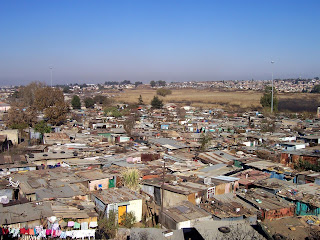 There was an article in a local South African newspaper, Sunday Tribune, today about the municipal government in KwaZulu Natal raiding and demolishing shacks in an illegal settlement in the province. If you don't know about the history and status of the housing crisis in SA, these are the basics:
There was an article in a local South African newspaper, Sunday Tribune, today about the municipal government in KwaZulu Natal raiding and demolishing shacks in an illegal settlement in the province. If you don't know about the history and status of the housing crisis in SA, these are the basics:
The percentage of households living in formal dwellings, whose dwellings were fully owned increased from
53,1% in 2002 to 58,1% in 2010. The growth in ownership was accompanied by a decline in the percentage of households partially owning dwellings. The provinces with the highest percentage of households whose main dwelling was informal in 2010 were Gauteng (21,5%), North West (18,8%), Western Cape (17%) and Free State (13,2%). North West has shown the least progress related to housing provision. Although a significant increase in the percentage of shack dwellers from 12,2% in 2002 to 23,7% in 2008 was followed by a decline to 18,8% in 2010, this is higher than the 2009 level. By contrast, the proportion of households who lived in informal dwellings were stagnant in Limpopo, Mpumalanga, KwaZulu-Natal and Eastern Cape. Dwelling sizes varied significantly between population groups with 86,6% of white-headed households and 76% of Indian/Asian households living in dwellings consisting of 6 rooms or more as opposed to 31,8% of black African and 41,8% of the coloured population groups. At the time of the survey, 18,9% of South African households were living in ‘RDP’ or state-subsidised dwellings. Female-headed households were appreciably more likely (11,1%) than their male counterparts (8,8%) to receive a government housing subsidy. Residents have, however, raised concern about the quality of subsidised houses and 17,2% said that the walls were weak or very weak while 17,9% regarded the dwelling roof as weak or very weak. More than 30% of households in Western and Eastern Cape reported problems with the quality of their walls and roofs. General Household Survey 2010
This is a bit outdated, but the basics are there. Any place you go that is near a city or large settlement will most likely have a shanty town nearby. The people living in these shacks have no other choice - the government has taken 20 years to reach the point it is at now in "solving" the housing crisis and they don't seem to be getting any better at it.
So in this news article the author tells of, because of some court order awarded in April, these shacks were being demolished. The eThekwini Slums Clearance Unit had torn down shacks in the KwaMadlala informal settlement twice this week. Residents claim that those members of the demolition unit verbally harass, as well as physically and deliberately destroy possessions such as crockery and even food. Members of the demolition unit also allegedly stole wallets, radios and building equipment (used to build the shacks) and utensils.
Most residents of this, and other, illegal settlements have been waiting for government housing for years. They were previously living in small, cramped houses with their entire family (brothers, sisters, parents, nieces, nephews, their own children etc) in segregated housing provided by the former apartheid government, before finally deciding to leave and form/join a new settlement in the hopes of at least being able to have more space for themselves.
 Many of these people are unemployed. Some had to leave previous accommodation due to not being able to afford rent of as little as R350 per month (about 30 Euros, or about US$40).
Many of these people are unemployed. Some had to leave previous accommodation due to not being able to afford rent of as little as R350 per month (about 30 Euros, or about US$40).
After their shacks are demolished, they have nowhere to go and no money, so they do what little they can to erect shelter and sleep outside next to the heaps of what used to be their home.
We see these shanty towns as a "blight" or a "nuisance" on our otherwise pleasant view - and when I say "we", I am including our dear government. Unfortunately, most of the people whose homes are being demolished continue supporting the ANC (ruling party of which Nelson Mandela was president), simply because, in their minds, the ANC uplifted us from apartheid and will eventually do the things they promised.
The truth is that we are still living in an apartheid, but this time race is not the deciding factor - money is.
Comments
Post a Comment